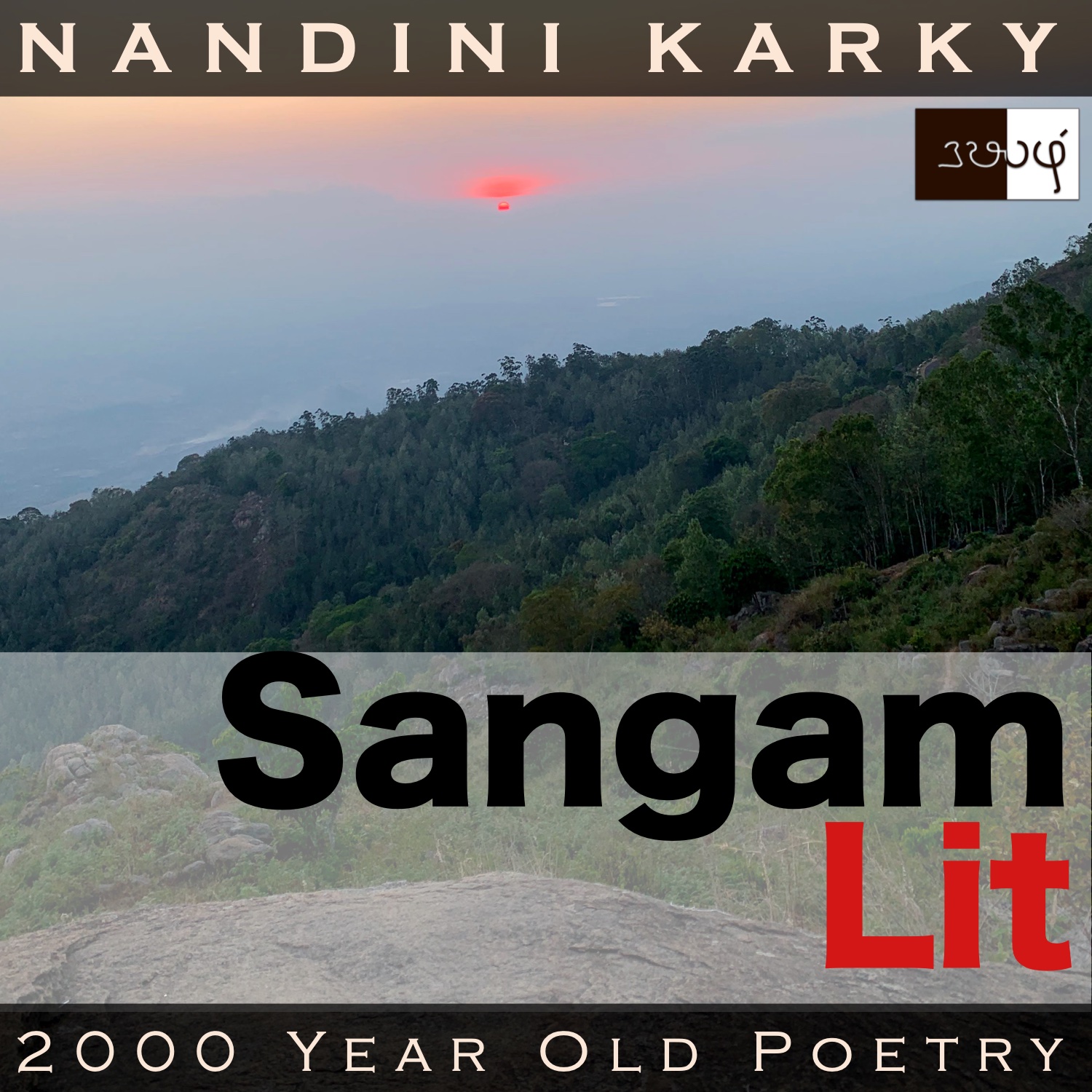Podcast: Play in new window | Download
Subscribe: Apple Podcasts | Spotify | Amazon Music | Android | iHeartRadio | TuneIn | RSS | More

In this episode, we perceive an intriguing technique in persuasion, as depicted in Sangam Literary work, Kurunthogai 179, penned by Kuttuvan Kannanaar. The verse is situated in the hills of ‘Kurinji’ and speaks in the voice of the confidante to the man, concealing a hidden message in her words to him.
கல்லென் கானத்துக் கடமா ஆட்டி,
எல்லும் எல்லின்று; ஞமலியும் இளைத்தன;
செல்லல்-ஐஇய!-உது எம் ஊரே;
ஓங்கு வரை அடுக்கத்துத் தீம் தேன் கிழித்த
குவையுடைப் பசுங் கழை தின்ற கய வாய்ப்
பேதை யானை சுவைத்த
கூழை மூங்கிற் குவட்டிடையதுவே.
‘Do stay at our village’ says a voice in this verse. The opening words ‘கல்லென் கானத்துக் கடமா ஆட்டி’ meaning ‘chasing bisons in the wild loudly’ narrates the hunting pursuits of someone. Next, the phrase ‘எல்லும் எல்லின்று’ meaning ‘the day is day no more’ is a unique way of saying that the evening is here. This is followed by ‘ஞமலியும் இளைத்தன’ meaning ‘dogs are tired’. Connecting to the hint of a hunt in the beginning, we can infer that these are ‘hunting dogs’. It’s interesting to note how the word ‘இளைத்தல்’ has come to mean ‘becoming slim’ in contemporary Tamil, whereas in this ancient usage, it means ‘becoming tired’. Negative connotations in losing weight seem to echo in ancient word formations too. A much relished delicacy appears in ‘அடுக்கத்துத் தீம் தேன்’ referring to ‘the sweet honeycombs in the ranges’. Other elements of the mountains appear in ‘பசுங் கழை’ meaning ‘green bamboo’ and ‘பேதை யானை’ meaning ‘naive elephant’. Ending with the words ‘கூழை மூங்கிற் குவட்டிடையதுவே’ meaning ‘in between the peaks seen through those short bamboo stalks’, the verse welcomes us to peer closer!
Bisons, honeycombs, elephants and bamboos – Feels like a safari in a mountain jungle! The context reveals that the man and lady were leading a love relationship and that the man was trysting with her by day, for a while. One day, the confidante tells the man, “Uproariously you chased behind bisons in the forest. Now, the day is losing light and dogs are tired too. Don’t go, my lord! In the tall mountains, a dense bunch of tender bamboo shoots that used to tear sweet honeycombs has been eaten by the curved-mouthed, naive elephant. Between the peaks glimpsed through these shortened bamboos, stands our village!” With these words, the confidante seemingly invites the man to the lady’s hamlet, and indirectly persuades him to seek a permanent union with the lady.
What do these glimpses of a day in the hills tell us? Let’s listen to the confidante’s words to find out. The confidante starts by listing the activities of the man just then. She says all day he’s been running behind wild bisons and now, the day was ending its shift. Her eyes wandering to the dogs walking along with the man, she adds they must be tired too. As we inferred earlier, the man has been hunting all day, with the aid of his dogs. After narrating the man’s present, the confidante puts forth a request asking him not to leave to his village far away. Instead, she points to a village, which can be glimpsed through the shortened bamboos – shortened by the hunger of naive elephants – saying those bamboos would have soared high to touch or even tear honeycombs high on top, had it not been for those hungry elephants.
In short, the confidante is inviting the man to stay in the lady’s village for the night. This may appear like a warm invitation to a tired person, after a whole day of strenuous effort. But the man knows he cannot stay at the lady’s village without formalising his union with her. So, the confidante is hinting indirectly to the man that he must seek the lady’s hand in marriage to relish her company always. By kindly offering an impossible suggestion, the confidante is illustrating a gentle way of nudging another to move in the path one wants. Skilful negotiation techniques for the twenty-first century sealed in the words of this two thousand year old verse!




Share your thoughts...